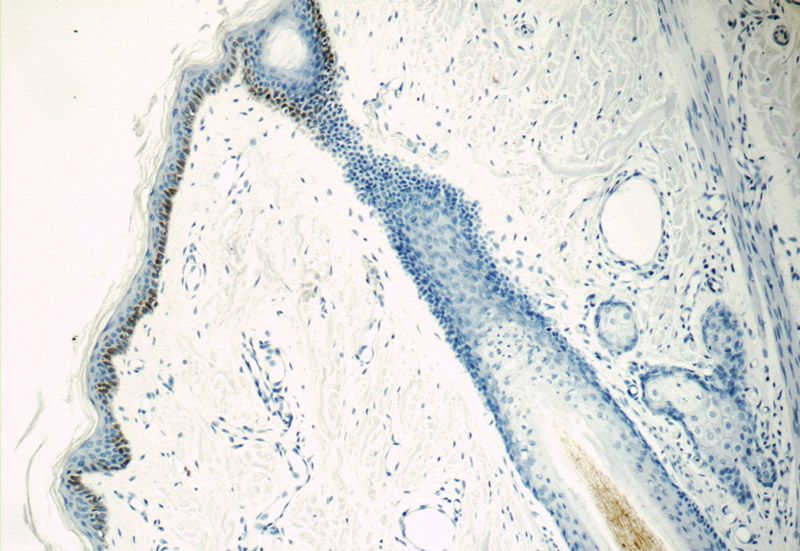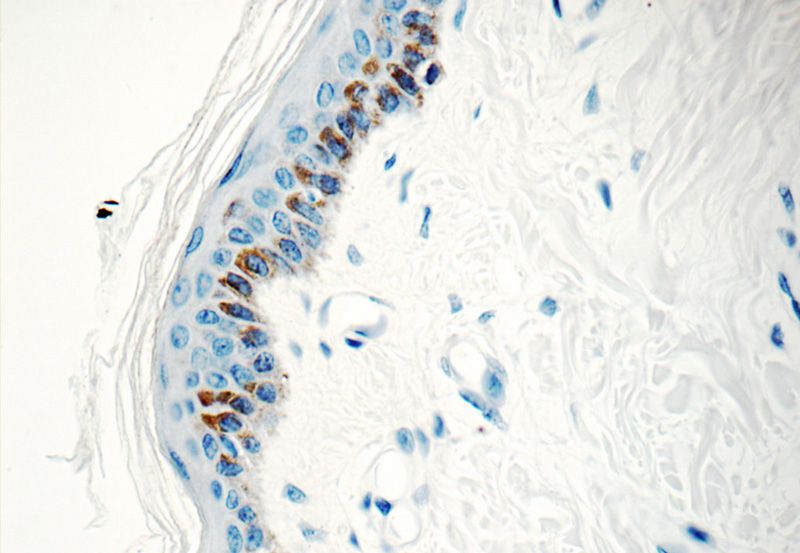-
Product Name
Kallikrein 5 antibody
- Documents
-
Description
Kallikrein 5 Rabbit Polyclonal antibody. Positive IHC detected in human skin tissue.
-
Tested applications
ELISA, IHC
-
Species reactivity
Human; other species not tested.
-
Alternative names
Kallikrein 5 antibody; Kallikrein like protein 2 antibody; kallikrein related peptidase 5 antibody; KLK L2 antibody; KLK5 antibody; KLKL2 antibody; SCTE antibody; Stratum corneum tryptic enzyme antibody
-
Isotype
Rabbit IgG
-
Preparation
This antibody was obtained by immunization of Kallikrein 5 recombinant protein (Accession Number: NM_001077491). Purification method: Antigen affinity purified.
-
Clonality
Polyclonal
-
Formulation
PBS with 0.1% sodium azide and 50% glycerol pH 7.3.
-
Storage instructions
Store at -20℃. DO NOT ALIQUOT
-
Applications
Recommended Dilution:
IHC: 1:20-1:200
-
Validations

Immunohistochemistry of paraffin-embedded human skin tissue slide using Catalog No:111904(KLK5 Antibody) at dilution of 1:50 (under 10x lens)

Immunohistochemistry of paraffin-embedded human skin tissue slide using Catalog No:111904(KLK5 Antibody) at dilution of 1:50 (under 40x lens)
-
Background
KLK5(Kallikrein-5) is also named as SCTE and belongs to the kallikrein subfamily. This protein is predicted to be a secreted serine protease, and the enzyme is found to have proteolytic activity. In serum and ascites fluid, the protein is present in two forms, one at a relatively lower molecular mass (around 50 kDa), and another one around 150-180 kDa and native KLK5 is highly glycosylated or that it may interact with the gel filtration column, leading to delayed retention(PMID:12873991). The activation of the enzyme has been shown to require cleavage of an arginine residue (Arg66-Ile67), suggesting that a trypsin-like serine protease may be involved in this process(PMID:15713679).
-
References
- Nin M, Katoh N, Kokura S, Handa O, Yoshikawa T, Kishimoto S. Dichotomous effect of ultraviolet B on the expression of corneodesmosomal enzymes in human epidermal keratinocytes. Journal of dermatological science. 54(1):17-24. 2009.
Related Products / Services
Please note: All products are "FOR RESEARCH USE ONLY AND ARE NOT INTENDED FOR DIAGNOSTIC OR THERAPEUTIC USE"
